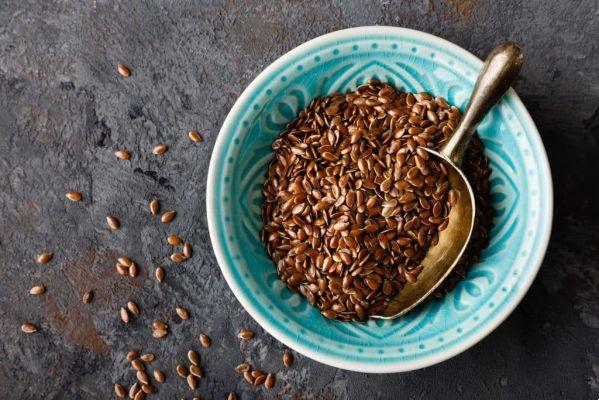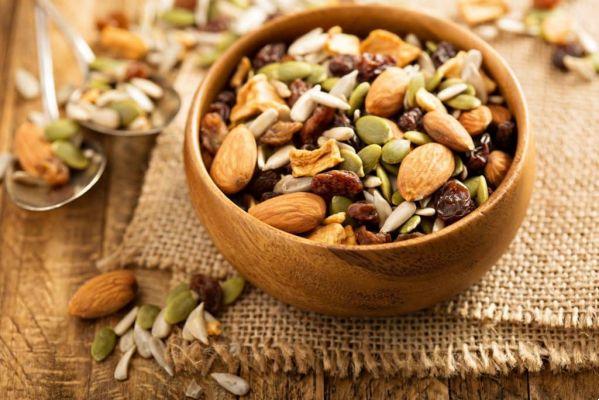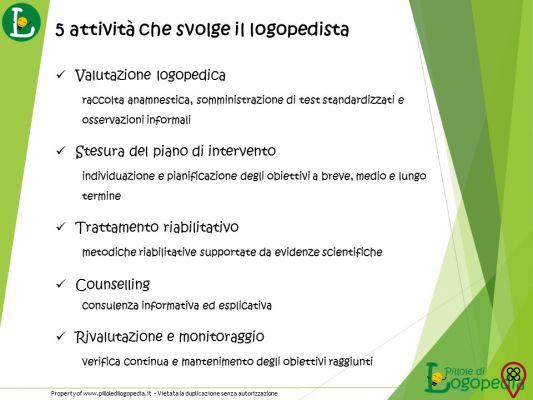Flaxseed is a seed that is part of the diet of many people who seek to have a healthier life. Flax seed (Linum usitatissimum) is found in accounts from 5.000 BC in Mesopotamia and drawings of it have appeared in tombs of pharaohs.
Belonging to the Linaceae family, flaxseed is considered a functional food, with nutritional properties and preventive characteristics against some diseases.
Keep reading, learn about the benefits of flaxseed and see how to use it in everyday life. Understand why, leaving Asia, its place of origin, it quickly spread across Europe and the world!
Flaxseed has many nutrients: Omega 3, 6 and 9. Omega 3 and omega 6 are found in proportions of one to three, close to the ideal, which is one to four.
It contains fiber, protein, minerals, vitamins C, E, B complex, magnesium, iron, zinc, potassium, calcium, phosphorus, carbohydrates, lignans and fatty acids.
The main health benefits of flaxseed are:
Favor bone health – flaxseed is a source of phytoestrogens, lignans, which balance estrogen in the body, allowing that, in menopause, when the production of this hormone naturally ends, the lack of it does not cause an acceleration in bone mass loss, causing osteoporosis.
Protect the body against cancer - lignans bind to the body's estrogen, prevent it from proliferating abundantly and prevent it from harming the mammary glands, ovaries, prostate and other parts of the body with some type of cancer. They also reduce tumor necrosis factor, present in inflammatory processes.

Decrease the symptoms of premenstrual tension (PMS) and menopause - flaxseed has isoflavone, phytosterols and lignans, responsible for controlling female hormones, favoring the reduction of undesirable symptoms of PMS and menopause, especially "heat".
Support the reduction of bad cholesterol (LDL) and increase good cholesterol – as it is rich in omega 3 and omega 6 and presents these two fats in almost ideal proportions, flaxseed helps to fight bad cholesterol and increase good cholesterol (HDL). ), preventing the formation of fatty plaques in veins and arteries, helping blood flow, preventing increased blood pressure, the occurrence of cerebrovascular accident (CVA) and heart attack.
Eliminate excess sodium in the kidneys - the omega 3 and 6 that flaxseed has in large amounts and in an adequate way favor the production of prostaglandin (lipid-soluble molecule, with regulatory function of several metabolic pathways), important to remove excess sodium from the kidneys. kidneys, decreasing fluid retention.
Lower Blood Sugar Levels – Alpha Linolenic Acid (ALA), one of the omega 3 subtypes in flaxseeds, has the ability to lower blood sugar levels, preventing and controlling type 2 diabetes.
Facilitate intestinal transit and reduce constipation – as it is rich in fiber, flaxseed stimulates the proliferation of bifidobacteria that act as a probiotic for the intestinal microbiota. Fiber also helps to decrease the absorption of fat in the intestine.
Increase the body's immunity – the bifidobacteria proliferated by the flaxseed fibers activate lymphocytes and the production of antibodies, increasing the body's immunity.
Produce hormones, enzymes, neurotransmitters and antibodies – flaxseeds are rich in plant proteins (molecules composed of one or more chains of amino acids) that stimulate essential functions for physical development.

Improve the skin – omega 3, contained in flaxseed, has anti-inflammatory power and therefore acts in the fight against acne, which is an inflammation of the skin. It, like vitamin E, also helps to prevent the harmful action of free radicals on cells, supporting the prevention of premature aging, improving the skin as a whole. Fibers (soluble and insoluble) help in the proper functioning of the intestine, eliminating toxins and impurities from the body, improving skin health.
Helping in the health and beauty of hair and scalp – as it has mineral properties and vitamins C and E, flaxseed helps to regenerate hair strands, balance pH and oil concentration concentrated in the scalp, as it regulates the sebaceous glands. . It nourishes the follicles, improves the elasticity of the strands, contributing to hair growth, improves blood circulation and has a natural conditioning action, leaving hair silky and easy to comb, in addition to helping to prevent graying, mainly because vitamin E it is an antioxidant and because vitamins and minerals help produce melanin, responsible for pigmenting the wires.
Fight tiredness and increase cognitive capacity – as it is rich in fiber, omega 3 and magnesium, flaxseed gives energy, reducing tiredness and stimulating the functioning of brain cells.
Composing paints, varnishes, dyes and linoleum – the main use of linseed in España is still industrial, as the oil extracted from the seeds is used as a drying agent in the production of paints, varnishes, dyes and linoleum.
How does flaxseed help you lose weight?
With obesity evolving around the world, more and more people are looking for healthy alternatives to achieve their ideal weight.
A well-balanced diet, directed by a nutritionist, according to individual needs is always recommended. This professional is able to evaluate the characteristics and lifestyle of each one and indicate the foods and combinations to achieve the desired goals.
Flaxseed helps to lose weight and can be indicated as part of the daily diet, especially for breakfast. The crushed seeds can be mixed with skimmed milk, low-fat yogurt, fruits, juices or morning smoothies.

Because it is rich in fiber, flaxseed keeps glucose levels balanced and prevents the hunger that sugar imbalance causes in the body. Fibers give you satiety and therefore the person does not feel the need to eat often, maintaining regular meals.
The omega 3 contained in the seeds fights the inflammation of the cells, allowing the body to accumulate less fat. Lignans, on the other hand, balance hormones, which in PMS tend to increase the desire to consume sweets.
Flaxseed, combined with a balanced and healthy diet, helps in weight loss and later in maintaining the ideal weight, but the intake should not be exaggerated, as daily excess can lead to food allergies.
We have two types of linseed available: brown and golden. There are some differences between them and the choice for which one to consume will depend on the objective to be achieved in preserving health.
Brown flaxseed is more bitter, while golden flaxseed is milder in flavor. The brown rind is more rigid, demanding more of the digestive process. Its price is more affordable, while golden flaxseed tends to cost more. Brown flaxseed contains 38% fat, 24,5% protein and 28% carbohydrates. Already in golden flaxseed, there is 37,5% fat, 23% protein and 30% carbohydrates.
How many spoons of flaxseed can we eat a day?
It contains more polyunsaturated and less monounsaturated fatty acids, a greater amount of alpha-linolenic acid and more linoleic acid, ideal for those who consume more omega-6 and less omega-3 fats. On the other hand, brown flaxseed has a higher concentration of antioxidants.
Both brown and golden flaxseeds are good for your health. The daily intake of flaxseed is recommended in the amount of a level spoon (soup) of crushed seeds, about 10g, which can reach 20g or two level spoons (soup).

They can be consumed as flour, seeds, oil, in salad preparations, rice, breads, cookies, vitamins, juices, cereals, cakes, farofas, with fruits and in many other ways. They do not change the flavor of the preparations. They should be kept indoors and protected from light to keep all their nutrients.
It is important to point out that flaxseed oil is contraindicated, in any amount or application for pregnant women, as it can cause prematurity of childbirth.
Simple recipes with flaxseed
Flaxseed can be consumed in several ways, as long as it has its seeds crushed. The oil should be kept at a low temperature (in the refrigerator) and consumed raw to season salads or smoothies. It must not be put on fire.
There are many preparations that can include ground flaxseeds, flour or oil. See some suggestions:
Mix of seeds and nuts with flaxseed

Ingredients:
1 teaspoon of ground flaxseed, 3 walnuts (halves), 1 tablespoon of sunflower seeds, 3 units of roasted almonds (without salt), 6 white raisins, 1 unit of apricots, 1 unit of prunes, 6 black raisins (can substitute with dried blueberries, raspberries or goji berries).
Preparation:
Mix all the ingredients and consume in the morning or afternoon snack.
Quick banana smoothie with flaxseed

Ingredients:
1 unit of small banana (medium) or apple banana, 1 cup (200 ml) of skimmed milk or 1 cup of low-fat natural yogurt, 1 tablespoon of oat flakes and 1 cup (200 ml) of milk skimmed
Preparation:
In the blender, place the sliced banana, milk or yogurt, flaxseed and oatmeal. Beat very well, about two minutes, until everything is homogeneous and very liquid. If you opt for yogurt, it will be a little more consistent. Mixer can be used.
Moroccan Couscous with Flaxseed

Ingredients:
50g of Moroccan couscous (semolina), strained juice of a Sicilian lemon or half a Tahiti lemon, 150ml of boiling water, 2 tablespoons of olive oil, 1 tablespoon of leek or red onion (can be white) well chopped, 1 tablespoon of flaxseed, 1 small grated carrot, 1 tablespoon of dark raisins, four coarsely chopped cashews, salt and nutmeg to taste, 5 units of cherry tomatoes, 1 basil leaf .
Preparation:
Place the couscous in a bowl and add the boiling water, a pinch of salt and the lemon juice. Mix well and set aside for approximately fifteen minutes. In a heated skillet, place the oil, onion and fry until translucent. Add the raisins, carrots and chestnuts. Stir quickly to combine the ingredients. Add the crushed flax seeds and mix. Mix the couscous with a fork so that it is loose. Add to skillet mixture and season with nutmeg. Hit the salt. Transfer to a plate and garnish with the tomatoes and basil leaf. Serves two people.
You may also like
- Discover another face of flaxseed, beneficial functional food
- Learn how to lose weight while you sleep and get started today!
- Discover 10 cereals to improve your diet
Golden or brown, flaxseeds guarantee a healthier life for those who consume them daily in adequate amounts. Considered a functional food that brings many health benefits, they also help to lose weight, when associated with a balanced diet.
The large amount of fiber ensures the proper functioning of the intestine and promotes satiety, contributing to the lower consumption of calories. Nutrients such as fatty acids and vitamins help prevent disease, support the immune system and delay premature aging.
With a very simple way of use, flaxseed has an advantageous cost-benefit ratio for those who want to maintain health in a natural way. Talk to your nutritionist and enjoy this millennial food in your diet!

























